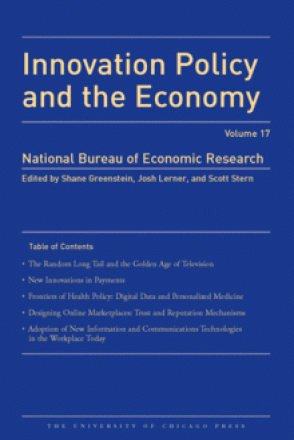Innovation Policy and the Economy, Volume 17

The seventeenth annual volume of Innovation Policy and the Economy brings the work of leading academic researchers to an audience of policymakers and those interested in the interaction between public policy and innovation. In the first chapter, Joel Waldfogel discusses how reduced costs of production have resulted in a “Golden Age of Television,” arguing that this development has gone underappreciated. The second, by Marc Rysman and Scott Schuh, discusses the prospects for innovation in payment systems, including mobile payments, faster payment systems, and digital currencies. In the third paper, Amalia Miller and Catherine Tucker analyze the consequences of patient data becoming virtually costless to store, share, and individualize, showing how data management and privacy issues have become central to health policy. The fourth, by Michael Luca, examines how online marketplaces have proliferated over the past decade, with a focus on the trust and reputation mechanisms used in designing online marketplaces In the fifth essay, Timothy Bresnahan and Pai-Ling Yin characterize information and communication technologies in the workplace, which have transformed production and shifted relative labor demand toward smart managers and professionals, and workers who are skilled at contributing to and interacting with other members of organizations.


